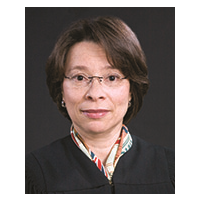FBI’s Secret Recording of Conversations on Courthouse Steps Not Illegal, Rules Federal Judge
 Judge Phyllis Hamilton
Judge Phyllis Hamilton
By Matthew Renda, Courthouse News Service
SAN FRANCISCO (CN) — A federal judge has ruled the practice of placing recording devices at the courthouse steps in two California counties is "unsettling" but does not run afoul of constitutional guarantees against warrantless searches.
In a 17-page ruling (pdf) issued July 22, U.S. District Judge Phyllis Hamilton acknowledged the practice of placing recording devices on the courthouse steps in Oakland and Martinez to capture the conversations of four defendants in a federal criminal fraud case was "unsettling," but said the four did not have a reasonable expectation of privacy when they engaged in discussions about the alleged fraud next to the FBI's microphones.
"While the court agrees with defendants that it is at the very least unsettling that the government would plant listening devices on the courthouse steps given the personal nature of many of the conversations in which people exiting the courthouse might be engaged, it is equally unrealistic for anyone to believe that open public behavior including conversations can be private given that there are video cameras on many street corners, storefronts and front porches, and in the hand of nearly every person who owns a smartphone," Hamilton wrote in her ruling.
The ruling is part of an ongoing case involving the four men, who stand accused of rigging bids to obtain hundreds of properties throughout Alameda and Contra Costa Counties.
According to a federal indictment filed by the Justice Department in 2014, Michael Marr, Gregory Casorso, Javier Sanchez and Victor Marr conspired to restrain competition by agreeing not to compete with one another during auctions for foreclosed properties and then splitting the proceeds or taking place in private secondary auctions known as "rounds."
As part of the case, the FBI placed recording devices in a light fixture along the steps of Alameda County Courthouse and just outside the Contra Costa County Courthouse, among other locations in proximity to both courthouses. The government then used the conversations they gathered from the devices during the grand jury proceedings.
The defense argued that the recordings were gathered in violation of the Fourth Amendment provision that guards against illegal search and seizure, and asked for the recordings and other evidence tainted by the recordings to be suppressed.
In her ruling, Hamilton agreed with prosecutors who argued that the men "did not have a reasonable expectation of privacy in their public oral communications outside the county courthouses."
The defendants forfeited their reasonable expectation of privacy when they bragged about their scheme to the local press and talked about it in loud voices in public places, Hamilton wrote.
The defense argued that the four men often huddled and talked in hushed tones, which showed they made significant efforts to keep their communications private — a necessary stipulation when asserting a reasonable expectation of privacy.
But Hamilton noted the recording devices did not use amplification technology and instead, recorded all the sounds in proximity and the four men could often be heard discussing their scheme in normal voices. At one point they even shouted over a jackhammer, Hamilton wrote.
"The sound quality of the audio recordings reflect that the recording devices only picked up voices in conversational or loud tones, and not hushed or whispered voices," Hamilton wrote.
Privacy advocates are concerned the ruling could establish a precedent allowing law enforcement to eavesdrop on attorneys and clients discussing aspects of their cases outside the courtroom.
Hamilton seems to anticipate this in her ruling.
"It is unlikely, and certainly unreasonable, for attorneys to risk breaching their confidential communications with clients by discussing sensitive matters out in the open, in conversational tones, in front of a public forum such as a courthouse, where they could easily be overheard by other attorneys, prosecutors, law enforcement officers, security personnel, court staff, judges, and other bystanders," she writes. "As an aside, it has been the court's observation that conversations near the courthouse entrance are frequently overheard by unintended and unseen listeners, even from inside the courthouse."
Meanwhile, the trial against the four individuals will proceed. According to the government, the four defendants made use of the voluminous numbers of foreclosures from 2008 to 2011, in the thick of the national housing crisis.
In California, foreclosed houses are often auctioned off on the courthouse steps. For this reason, government lawyers argued there was a need to place recording devices in proximity to the auctions to gather details on the alleged fraud.
Martha Boersch, who represents the defendants, declined to comment.
To Learn More:
USA v. Michael Marr, et al. (U.S. District Court, Northern District of California) (pdf)
North Carolina Judges May Allow Disclosure of Records on Secret Police Use of Closely Guarded FBI Surveillance Gear (by Noel Brinkerhoff, AllGov)
Director Comey Admits FBI does Conduct Surveillance without a Warrant (by Noel Brinkerhoff and Danny Biederman)
FBI Wants More Authority to Spy Live on Gmail, Skype, Dropbox and Cloud (by Matt Bewig, AllGov)
FBI Accused of Violating Surveillance Laws 40,000 Times (by Noel Brinkerhoff and David Wallechinsky, AllGov)
- Top Stories
- Unusual News
- Where is the Money Going?
- Controversies
- U.S. and the World
- Appointments and Resignations
- Latest News
- Trump Orders ICE and Border Patrol to Kill More Protestors
- Trump Renames National Football League National Trump League
- Trump to Stop Deportations If…
- Trump Denounces World Series
- What If China Invaded the United States?






Comments